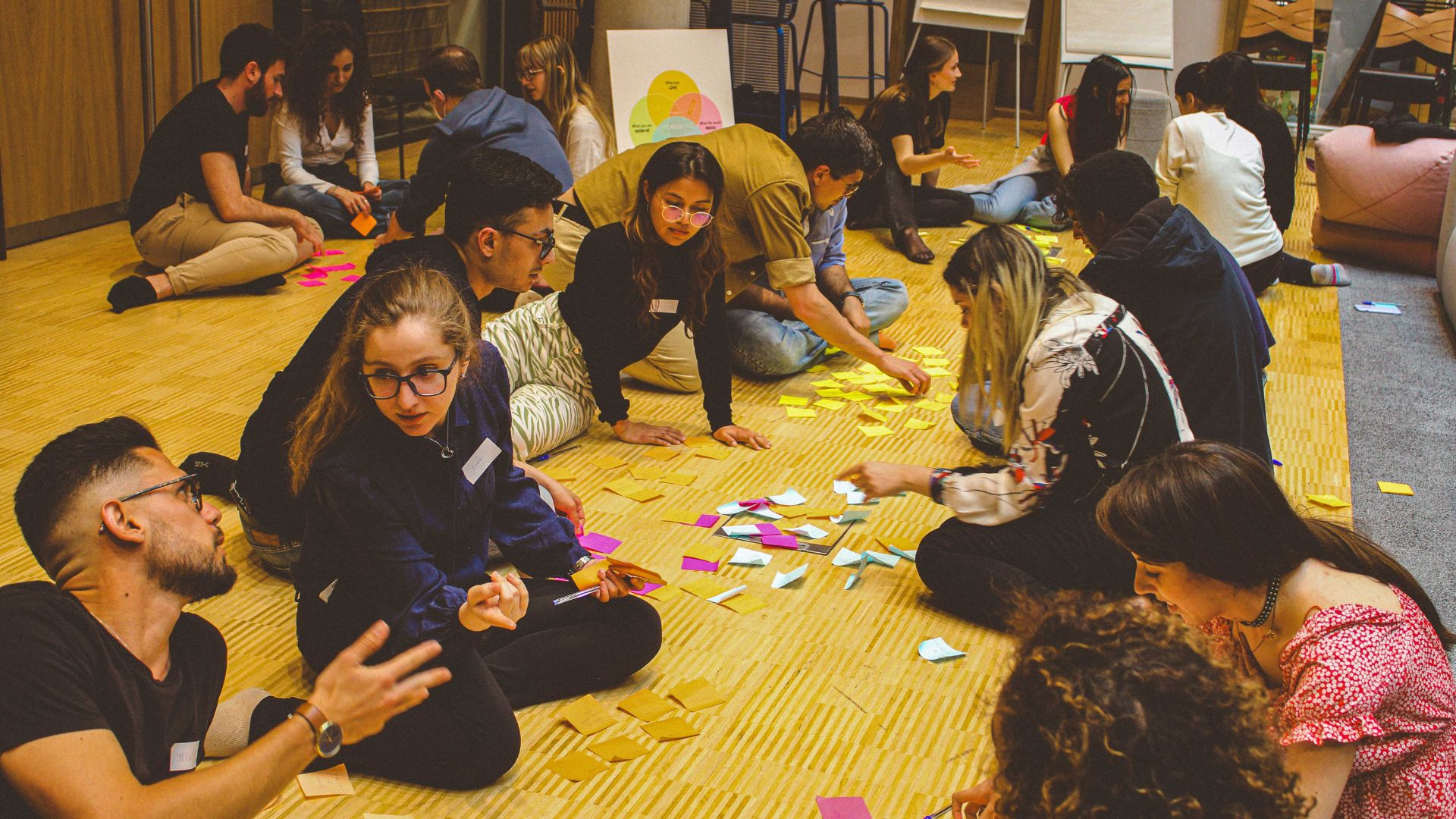Graduate Schools combine master’s degree and doctorate programmes, supported by research laboratories. This means that students can work on a wide range of relevant problems, benefiting from the diversity of these courses and the feedback of students who have already done them !

Multidisciplinary Excellence
Project: SMARTS-UP[1] is a bold initiative to reshape the face of higher education at Université Paris Cité. This project was developed in response to the changing dynamics of research and education and it epitomises innovation, collaboration, and academic precision. Supported by funding from ANR[2] and IdEx[3], the purpose of this project is to improve the relationships between master’s and doctoral students, the university’s cutting-edge research laboratories and the region’s economic and social players.
By integrating leading research laboratories with advanced training programmes, you can try your hand at solving real-world problems, engaging with the scientific community and local authorities. This strategic alignment not only enriches your experience but also bridges the gap between theoretical knowledge, solutions, and practical applications.
Graduate Schools acknowledge the significance of multidisciplinary skills in today’s job market, enabling you to cultivate cross-disciplinary expertise beyond conventional boundaries and shape your own career path.
[1] Student-centred iMproved Active Research-based Training Strategy at Université Paris Cité
[2] French National Research Agency
[3] Initiatives of Excellence
The Advantages of Studying at a Graduate School
By offering a unique blend of theoretical and practical laboratory courses, you are introduced to a variety of research methodologies and techniques for solving global and societal problems. This not only enhances your learning, but also fosters a sense of belonging and contribution to the scientific community.
The goal of Graduate Schools is to help to you advance outside the confines of traditional academia, equipping you with the skills, knowledge, and mindset to meet the challenges of today’s interconnected globalised world. There are many advantages to studying at a Graduate School :
- Enrol in Top-quality Courses with Close Links to the World of Research
You will be able to take part in cutting-edge research projects, to work with esteemed members of the teaching staff, and to carve out a place for yourself in the scientific community. The unique way in which these Graduate Schools are structured offers a smooth progression from Master’s degree to doctorate. Furthermore, by undertaking work placements and theses in the associated laboratories, you will profit from a coherent and comprehensive learning pathway, enabling you to hone your research interests and your expertise over the years.
“At the end of the third year of my thesis, I took advantage of the SMARTS-UP Graduate Schools outgoing mobility scheme to spend two weeks doing research at the University of Turku in Finland […] As our research was very basic, I wanted to explore more applied research on equipment during this stay. By assembling batteries myself, I have gained a better understanding of how they work and this has helped me to adapt my experiments and make them more representative of real batteries. The experience introduced me to a very stimulating and caring research environment, focused on the well-being of researchers.”
GODEFFROY Louis- Developing skills within a multidisciplinary programme
The focus is on developing multi and interdisciplinary skills. You are prepared for a wide range of careers, both inside and outside academia. By engaging with experts from a variety of disciplines, either during your placement or at affiliated research institutes, you gain a broader perspective and the ability to approach problems from different angles – a crucial skill today.
“As part of my thesis, fieldwork in South Korea was an important step […] I learned new research techniques and methodologies and met specialists in psychiatry and psychology, as well people in charge of associations. Given that international comparative research methodologies are increasingly necessary in a growing number of fields, I believe that Graduate Schools will provide substantial opportunities for international comparative research in the future. I would like to stress that they encourage and support comparative research between France and non-EU countries, thus departing from the EU-centric trend of international comparative research.”
JEONG Jiwon- Creating international links
The global reach of the Graduate School courses, facilitated by mobility grants for both incoming and outgoing students, provides you with opportunities to encounter a variety of cultures, methodologies, and academic traditions, enriching your vision of the world. Furthermore, studying in English improves your language skills and prepares you better for international collaboration and careers.
“Without the SMARTS-UP scholarship, I wouldn’t have been able to come to France to follow my dream of studying biomedical engineering. This is an undeveloped field in Costa Rica, where I come from […] Coming to study in France has absolutely changed my life and my perspectives on many subjects. It gave me the opportunity to get to know different cultures and ethnic groups that I would never have encountered if I’d stayed in my home town. It has taken me out of my comfort zone in all areas, and this has enabled me to develop both personally and professionally.”
ROJAS MENDEZ Tamara- Maintaining a close relationship with the teaching staff and developing a professional network
Interaction between teaching and research staff fosters a mentoring and collaborative environment. You can get personalised advice, engage in in-depth discussions and develop a professional network. Events organised by the Graduate Schools offer invaluable networking opportunities. From traditional conferences and seminars to innovative afterworks and hackathons, all these events bring students into contact with industry experts, local authorities, NGOs, future peers and potential employers. These opportunities provide a strong link with the world of work, helping students to enter the job market.
“The teaching staff are highly accessible, they’re ready to discuss things, they’re approachable, and they listen. This is a considerable advantage. […] It was particularly interesting to engage in conversations with distinguished professors and researchers. They were approachable and offered guidance as we navigated an unfamiliar academic environment. When you’re a student, you don’t really know what’s going on in a faculty. You go to classes and you take exams, but you don’t realise that there are researchers working in the labs above you. There are some big projects with considerable funding, and it’s good to be able to talk to staff to understand how everything works.”
ROMAND Louis“Joining this professional master’s programme has been beneficial, facilitating my integration into the French professional landscape. It has allowed me to connect with specialists in my field of interest and explore areas beyond the academic realm. For example, we worked with a national park, but also with the town hall of a suburb of Nantes. This is an advantage and it has increased the number of things that I can now do.”
BECERRIL NITO VictoriaConclusion
Graduate Schools embody a vision of excellence that surpassed traditional limitations. By combining research, education and societal engagement, this model promotes multidisciplinarity, internationalisation and collaboration to provide the best possible support for the next generation of innovators and future decision makers.
À lire aussi

Lancement du Club Innovateurs de l’université Paris Cité
Le 3 juillet 2024 s’est tenue la réunion de lancement du Club Innovateurs de l’université Paris Cité au Liberté Living Lab. Cette initiative réunit des chercheuses et des chercheurs employés ou hébergés par UPCité, ayant obtenu un concours...
read more
Participez à la journée de Sensibilisation à la Science Ouverte de Circle U. !
Le 28 septembre prochain, l’équipe de Circle U., l'alliance européenne vous donne rendez-vous sur le campus des Grands Moulins pour participer à une journée de sensibilisation à la Science Ouverte. Au programme : ateliers sur les sciences participatives et la gestion...
read more
Université Ouverte : découvrez le programme 2024-2025 !
Vous souhaitez apprendre une langue étrangère ? Vous initier à l’histoire de l’art ? Enrichir votre culture générale au travers de cours d’histoire ou de géopolitique ? Découvrir les mécanismes de notre cerveau ou encore vous initier à l'astrophysique ?...
read more
Du 11 au 14 septembre 2024, les sciences humaines et sociales investissent la Cité
Autour de trois grandes thématiques en lien avec les valeurs des Jeux Olympiques et Paralympiques - jeux & créativité, rivalités, migration & racisme - venez découvrir ou re-découvrir les sciences humaines et sociales lors des Olympiades Humanités et sciences...
read more